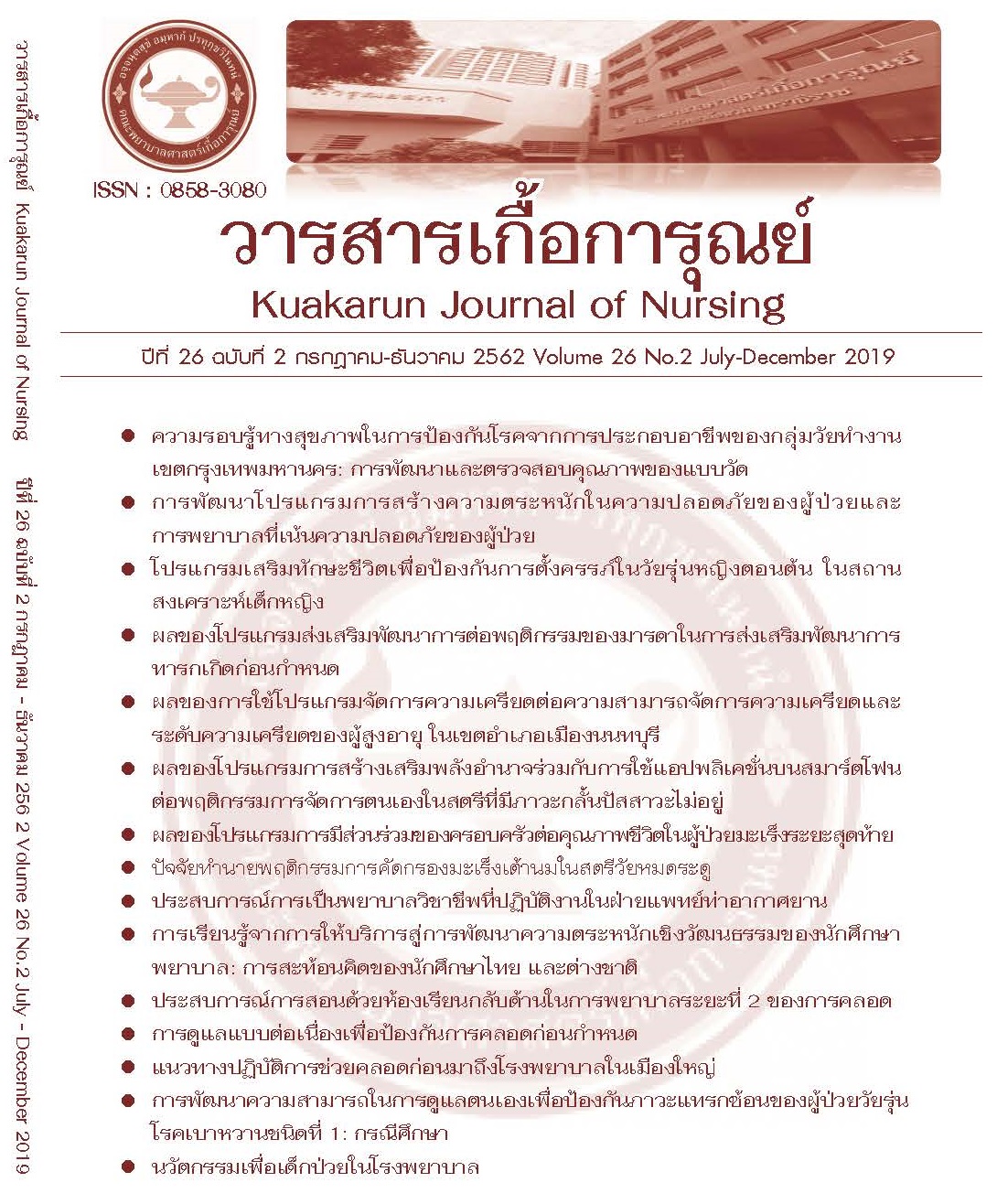ผลของการใช้โปรแกรมจัดการความเครียดต่อความสามารถจัดการความเครียดและระดับความเครียดของผู้สูงอายุในเขตอำเภอเมืองนนทบุรี
คำสำคัญ:
ความเครียด, ความสามารถจัดการความเครียด, โปรแกรมจัดการความเครียด, ผู้สูงอายุบทคัดย่อ
โปรแกรมจัดการความเครียดที่เหมาะสมจะทำให้ผู้สูงอายุสามารถจัดการความเครียดได้ดี ส่งผลให้ผู้สูงอายุมีความเครียดลดลง และมีคุณภาพชีวิตที่ดีขึ้น การวิจัยครั้งนี้ใช้แบบแผนการทดลองแบบกลุ่มเดียววัดสองครั้ง วัตถุประสงค์ของการวิจัยเพื่อเปรียบเทียบความสามารถจัดการความเครียดและระดับความเครียดของกลุ่มทดลองก่อนและหลังเข้าร่วมโปรแกรมจัดการความเครียด เลือกกลุ่มตัวอย่างแบบเจาะจงเป็นกลุ่มทดลองจากผู้สูงอายุที่มารับบริการวิชาการของวิทยาลัยพยาบาลบรมราชชนนี จังหวัดนนทบุรี โดยเลือกผู้ มีอายุระหว่าง 60–75 ปี และมีความเครียดในระดับปานกลาง จำนวน 45 คน เครื่องมือที่ใช้ในการทดลองคือ โปรแกรมจัดการความเครียดที่พัฒนาจากการประยุกต์แนวคิดการให้คำปรึกษาโดยยึดผู้รับคำปรึกษาเป็นศูนย์กลางตามทฤษฎีของโรเจอร์ และโปรแกรมจัดการความเครียดของอรวรรณ รอนราญ ซึ่งประกอบด้วย 5 กิจกรรม ได้แก่ การสร้างสัมพันธภาพ การฝึกการหายใจ การฝึกการผ่อนคลายกล้ามเนื้อ การฝึกการทำสมาธิ และการให้คำปรึกษาแบบกลุ่มที่ใช้ผู้รับคำปรึกษาเป็นศูนย์กลาง ใช้เวลาในการร่วมกิจกรรม สัปดาห์ละ 1 กิจกรรม จำนวน 5 สัปดาห์ เครื่องมือที่ใช้เก็บรวบรวมข้อมูลคือ แบบวัดความสามารถจัดการความเครียดของนิธิพันธ์ บุญเพิ่ม และแบบวัดความเครียดสวนปรุงของสุวัฒน์ มหัตนิรันดร์กุล และคณะ ซึ่งมีความเชื่อมั่น .84 และ .91 ตามลำดับ วิเคราะห์ข้อมูลด้วยสถิติบรรยาย ได้แก่ ร้อยละ ค่าเฉลี่ย ส่วนเบี่ยงเบนมาตรฐาน และสถิติอ้างอิงใช้สถิติทดสอบ Paired-samples t-test
ผลการวิจัยพบว่า หลังเข้าร่วมโปรแกรมจัดการความเครียด ผู้สูงอายุมีความสามารถจัดการความเครียดสูงกว่า แต่มีระดับความเครียดต่ำกว่าก่อนเข้าร่วมโปรแกรมจัดการความเครียดอย่างมีนัยสำคัญทางสถิติที่ระดับ .05 แสดงว่าโปรแกรมจัดการความเครียดมีความเหมาะสมกับผู้สูงอายุ ดังนั้น สมควรนำโปรแกรมจัดการความเครียดนี้ไปใช้กับผู้สูงอายุในพื้นที่จังหวัดนนทบุรี
เอกสารอ้างอิง
กรมสุขภาพจิต กระทรวงสาธารณสุข. (2554). รายงานประจำปี 2554. กรมสุขภาพจิต กระทรวงสาธารณสุข.
กรมสุขภาพจิต กระทรวงสาธารณสุข. (2557). แนวทางการดูแลทางด้านสังคมจิตใจของผู้สูงอายุเพื่อป้องกันปัญหาสุขภาพจิต. กรุงเทพมหานคร: ชุมนุมสหกรณ์การเกษตรแห่งประเทศไทย.
ขนิษฐา ตลอดภพ, วรรณภา ประทุมโทน, อังคณา เรือนก้อน, และเริงนภรณ์ โม้พวง. (2555). ปัจจัยที่มีผลต่อความเครียด
ของผู้สูงอายุ ต.บ้านคลอง อ.เมือง จ.พิษณุโลก. วารสารวิชาการและวิจัย มทร.พระนคร,ฉบับพิเศษ, 174 – 179.
จมาภรณ์ ใจภักดี. (2557). ผลของการฝึกหายใจแบบลึกร่วมกับการผ่อนคลายกล้ามเนื้อต่อระบบความดันโลหิตและความเครียดในผู้ป่วยความดันโลหิตสูง (วิทยานิพนธ์ปริญญามหาบัณฑิต). มหาวิทยาลัยมหิดล,กรุงเทพมหานคร.
ชาตรี จุติตรี. (2553). ผลของโปรแกรมการผ่อนคลายกล้ามเนื้อแบบโพรเกรสสิพร่วมกับการให้ความรู้ต่อความเครียดและความดันโลหิตของผู้ป่วยสูงอายุโรคความดันโลหิตสูงแผนกผู้ป่วยนอก (วิทยานิพนธ์ปริญญามหาบัณฑิต). จุฬาลงกรณ์มหาวิทยาลัย, กรุงเทพมหานคร.
นภา พวงรอด. (2555). การศึกษาภาวะซึมเศร้าของผู้สูงอายุในจังหวัดนนทบุรี. วารสารมหาวิทยาลัยนราธิวาส ราชนครินทร์, 2(1), 63-74.
นิธิพันธ์ บุญเพิ่ม. (2553). ความเครียดและการจัดการความเครียดของนักศึกษาวิทยาลัยการแพทย์แผนไทย มหาวิทยาลัยเทคโนโลยีราชมงคลธัญบุรี (การศึกษาค้นคว้าอิสระปริญญามหาบัณฑิต ไม่ได้ตีพิมพ์). มหาวิทยาลัยศิลปากร, กรุงเทพมหานคร.
นิธิพัฒน์ เมฆขจร. (ม.ป.ป.) จิตวิทยาสังคม:การผ่อนคลายความเครียดสำหรับผู้สูงอายุ.สืบค้นจาก https://www.stou.
ac.th /stoukc/elder/main.html
บุษกุล ศุภอักษร. (2554). ผลของโปรแกรมการจัดการความเครียดต่อการทำหน้าที่ของผู้ป่วยจิตเภทในชุมชน (วิทยานิพนธ์มหาบัณฑิต). จุฬาลงกรณ์มหาวิทยาลัย, กรุงเทพมหานคร.
ปาริชาติ แว่นไวศาสตร์, เจนจิรา เกียรติสินทรัพย์, และวิไลพร ขำวงษ์. (2557). ความเครียดของผู้สูงอายุในเขตอำเภอเมืองจังหวัดนนทบุรี (รายงานการวิจัย ไม่ได้ตีพิมพ์). วิทยาลัยพยาบาลบรมราชชนนี, นนทบุรี.
พัชรี แสงอรุณ. (2552). ผลของโปรแกรมการฝึกสมาธิแบบอานาปานสติร่วมกับการหายใจแบบเป่าปากต่อระดับความเครียดในผู้ป่วยสูงอายุโรคปอดอุดกั้นเรื้อรังที่มารับการรักษาในโรงพยาบาล (วิทยานิพนธ์ปริญญา). จุฬาลงกรณ์มหาวิทยาลัย, กรุงเทพมหานคร.
มหาวิทยาลัยสุโขทัยธรรมาธิราช. (2557). สังคมผู้สูงอายุ: นัยต่อการพัฒนาประเทศ. สืบค้นจาก https://www.stou. ac.th/stouonline/lom/data/sec/Lom12/05-01.html
มูลนิธิสถาบันวิจัยและพัฒนาผู้สูงอายุไทย. (2557). สถานการณ์ผู้สูงอายุไทย พ.ศ 2557. สืบค้นจากhttps://www.m-society.go.th/article_attach/16057/19114.pdf
เมธี วงศ์วีระพันธุ์. (2559). การส่งเสริมสุขภาพจิตสำหรับผู้สูงอายุของชุมชนต้นแบบในจังหวัดเชียงใหม่.วารสารจิตวิทยาคลินิก, 47(1), 38-47.
สุวัฒน์ มหัตนิรันดร์กุล, วนิดา พุมไพศาลชัย, และพิมพ์มาศ ตาปัญญา. (2540). การสร้างแบบวัดความเครียดสวนปรุง. วารสารสวนปรุง, 13, 1-20.
สำนักงานสถิติแห่งชาติ. (2557). รายงานการสำรวจประชากรสูงอายุในประเทศไทย พ.ศ. 2557. กรุงเทพมหานคร: เท็กซ์ แอนด์ เจอร์นัล พับลิเคชั่น.
อาภรณ์ สิงห์ชาดา, กุลวดี โรจน์ไพศาลกิจ และสมใจ นกดี. (2559). ผลของโปรแกรมการจัดการความเครียดต่อความเครียดของผู้สูงอายุ, วารสาร มฉก.วิชาการ, 19(38), 49-60.
อรวรรณ รอนราญ. (2552). ผลของโปรแกรมการจัดการความเครียดต่อความเครียดและอาการปวดศีรษะในผู้มีอาการปวดศีรษะจากความตึงเครียด (วิทยานิพนธ์ปริญญามหาบัณฑิต). มหาวิทยาลัยเชียงใหม่, เชียงใหม่.
Lazarus, R., & Folkman, S. (2000). Stress appraisal and coping. New York: Springer Publishing.
Rogers, C.R. (2003). Client-centered therapy: Its current practice, implications, and theory (Kindle Ed.). London: Constable & Robinson.

















